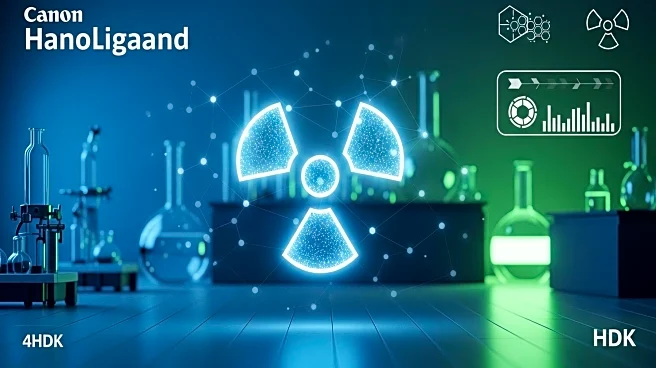What's Happening?
Sanofi has announced that its radioligand therapy (RLT) for gastroenteropancreatic neuroendocrine tumors (GEP-NETs) has met all objectives in a phase 2 study, paving the way for potential regulatory filings. The therapy, known as AlphaMedix (212Pb-dotamtate), was developed in collaboration with Orano Med and RadioMedix. The trial demonstrated effectiveness in both treatment-naïve GEP-NET patients and those previously treated with Novartis' Lutathera (177-dotatate). Sanofi increased its stake in Orano Med last year, investing €300 million ($325 million) to strengthen their partnership. AlphaMedix, an alpha particle emitter, offers the potential to limit radiation exposure to healthy tissue, reducing side effects. The FDA granted it breakthrough designation last year for both PRRT-exposed and PRRT-naïve patients.
Why It's Important?
The successful phase 2 trial of AlphaMedix represents a significant advancement in the treatment of GEP-NETs, a challenging form of cancer. The therapy's ability to deliver highly potent alpha-emitters directly to cancer cells could provide a new treatment option for patients, potentially improving survival rates and quality of life. This development is crucial as it addresses supply issues associated with other alpha emitters, positioning Sanofi and its partners favorably against competitors like Novartis, AstraZeneca, and Bayer. The breakthrough designation by the FDA underscores the therapy's potential impact on the oncology market, offering hope for patients with limited treatment options.
What's Next?
Sanofi and its partners are expected to proceed with regulatory filings for AlphaMedix, aiming to bring the therapy to market. As the full data from the phase 2 trial becomes available, it will likely influence the approval process and subsequent commercialization strategies. Competitors such as ITM and Lantheus are also advancing their own radioligand therapies, which could lead to increased competition in the GEP-NET treatment space. Stakeholders, including healthcare providers and patients, will be closely monitoring these developments, anticipating new treatment options that could reshape the landscape of neuroendocrine tumor therapies.
Beyond the Headlines
The development of AlphaMedix highlights the growing interest in radioligand therapies as a targeted cancer treatment. The use of alpha particles, as opposed to beta particles, represents a shift towards minimizing collateral damage to healthy tissues, which is a critical consideration in cancer treatment. This approach may set a precedent for future therapies, encouraging further research and investment in alpha-emitting radioligand technologies. Additionally, the collaboration between Sanofi, Orano Med, and RadioMedix exemplifies the importance of strategic partnerships in advancing medical innovations.









